新概念英语第三册语法精粹
新概念英语第三册语法精粹:平行结构

新概念英语第三册语法精粹:平行结构很多句子在描述一个人或一件物品时往往会出现一系列修饰语;动词的修饰语,即副词往往也会几个同时使用,构成平行结构,平行结构要求语法结构须保持一致,如:1.系列动词:after school, we sang, danced and played the piano in the classroom.2.系列形容词:She is slim, tall, blond and beautiful.3.系列副词:The students are listening to me carefully and eagerly.平行结构不但包括动词,形容词,副词,也包括分词,不定式,动名词,名词短语和句子等的平行用法,务必提升辨别力。
测试精编:单选:1. The purpose of the research had a different meaning for them than ________.A. oursB. for ours it hadC. with usD. it did for us2. The decision to ration a commodity rests on a judgement of its relative scarcity, ________ and the feasibility of continuing it.A. it is importantB. is it importantC. its importanceD. what is its importance3. Scandinavian countries make household goods that are designed both to function well ________.A. and to be looking beautifulB. and to look beautifulC. and to be beautiful lookingD. as well as to look beautifully4. The chairman urged the members of the committee to set aside their differences ________.A. and began to workB. starting to begin to workC. and be settled for workD. and settle down to work5. In his novels the author combines sound scholarship with ________.A. a witty styleB.a style of witC. a style full of witD. a style which witty6. During the examination we were supposed to stay in our seats, keep our eyes on our work, ________ to anyone.A. but could not talkB. rather than speakC. instead of speakingD. and not speak7. Paris is renowned both as the political center of the nation and as ________.A. the cultural center alsoB. a center of cultural activityC. being a cultural centerD. to be a center of cultural activity8. The bonding power of any adhesive depends on the cohesion of the adhesive itself and ________ to the surface to whichit is applied.A. how well does the adhesive adhereB. how well the adhesive adheresC. does the adhesive adheresD. the adhesive adheres。
新概念英语第三册语法精粹汇总
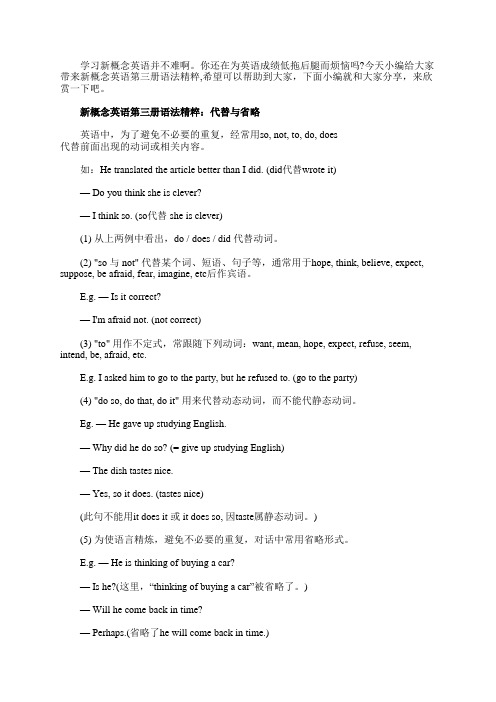
学习新概念英语并不难啊。
你还在为英语成绩低拖后腿而烦恼吗?今天小编给大家带来新概念英语第三册语法精粹,希望可以帮助到大家,下面小编就和大家分享,来欣赏一下吧。
新概念英语第三册语法精粹:代替与省略英语中,为了避免不必要的重复,经常用so, not, to, do, does代替前面出现的动词或相关内容。
如:He translated the article better than I did. (did代替wrote it)— Do you think she is clever?— I think so. (so代替 she is clever)(1) 从上两例中看出,do / does / did 代替动词。
(2) "so 与 not" 代替某个词、短语、句子等,通常用于hope, think, believe, expect, suppose, be afraid, fear, imagine, etc后作宾语。
E.g. — Is it correct?— I'm afraid not. (not correct)(3) "to" 用作不定式,常跟随下列动词:want, mean, hope, expect, refuse, seem, intend, be, afraid, etc.E.g. I asked him to go to the party, but he refused to. (go to the party)(4) "do so, do that, do it" 用来代替动态动词,而不能代静态动词。
Eg. — He gave up studying English.— Why did he do so? (= give up studying English)— The dish tastes nice.— Yes, so it does. (tastes nice)(此句不能用it does it 或 it does so, 因taste属静态动词。
新概念英语第三册语法汇总和习题
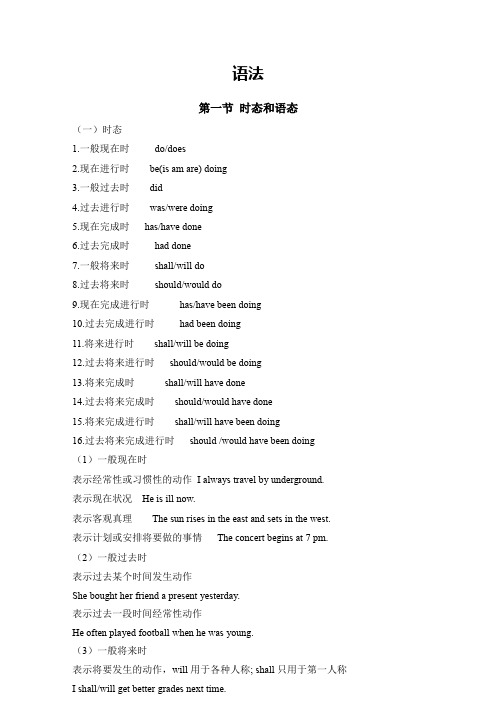
语法第一节时态和语态(一)时态1.一般现在时do/does2.现在进行时be(is am are) doing3.一般过去时did4.过去进行时was/were doing5.现在完成时has/have done6.过去完成时had done7.一般将来时shall/will do8.过去将来时should/would do9.现在完成进行时has/have been doing10.过去完成进行时had been doing11.将来进行时shall/will be doing12.过去将来进行时should/would be doing13.将来完成时shall/will have done14.过去将来完成时should/would have done15.将来完成进行时shall/will have been doing16.过去将来完成进行时should /would have been doing(1)一般现在时表示经常性或习惯性的动作I always travel by underground.表示现在状况He is ill now.表示客观真理The sun rises in the east and sets in the west.表示计划或安排将要做的事情The concert begins at 7 pm.(2)一般过去时表示过去某个时间发生动作She bought her friend a present yesterday.表示过去一段时间经常性动作He often played football when he was young.(3)一般将来时表示将要发生的动作,will用于各种人称; shall只用于第一人称I shall/will get better grades next time.Your parents will be glad to hear that you return home."am / is / are going to+动词原形”用来表示事先考虑过的将要发生的动作Jean is going to meet me at the airport.”be doing”表示根据现在计划或安排做某事I am taking Jane out of dinner tonight.be+(about) to do, 表示近期内要做的事情注意:不能与时间状语连用The new school year is about to start.难点:主将从现时间状语从句:when, whenever, since, till, once, as soon as, while, as ,before, afterI will be an English teacher when I grow up.条件状语从句:if, unless, as long as, so long asIf I have extra money, I will pay the bill for you.(4)现在进行时目前在做的动作He is studying physics very hard these days.现阶段在进行动作I hear you are writing a novel.与always, forever, constantly,continually表达有感情色彩的词汇He is forever asking silly questions like a stupid guy.(5)过去进行时过去某个时刻正在进行动作We were taking photos on the mountains.过去某段时间内的动作I was talking about the new book yesterday morning.(6)将来进行时将来某个时刻正在进行动作When I get home, my mother will be cooking dinner.计划将来要发生的事情She will be studying French at college this time next year.(7)现在完成时已经完成某事,过去的动作对现在有影响We have just e back from the United States.表示过去某一行为持续到现在,可能继续持续下去They have been best mates since school.have been to 曾去过某地,现在已经不在have gone to 已经去了某地,现在可能还在去的路上My father has been to Beijing.My father has gone to Beijing.固定句型:It is the+序数词+time that sb have/has done sth“这是某人第几次去......”It is the first time that his painting has been displayed to the public.(8)过去完成时“过去的过去”:过去某个时间开始一直延续到过去另一个时间的动作I had read half of the book by yesterday.By the time they finished the job, we had reached more.固定句型:It was the+序数词+time that sb had done sth“这是某人第几次去......”It was the second time that I had met the same kind of problem.固定句型:no sooner+过去完成时+than+一般过去时hardly+过去完成时+when+一般过去时scarcely+过去完成时+when+一般过去时“一......就......”They had no sooner reached the office than it began to rain.=They had hardly reached the office when it began to rain.=They had scarcely reached the office when it began to rain.表示过去未曾实现的愿望,与动词intend, mean, plan, hope, wish, want, think, expect 连用I had meant to e ,but something happened.(9)现在完成进行时过去某一时间开始持续到现在,并且继续持续下去I have been waiting for an hour, but he still hasn’t turned up.(10)将来完成时表示将来某时刻之前或某动作前已经发生的动作We shall/wiil have met that manager by next Monday.表示一个持续到将来某时之前或某动作发生之前的动作By next Monday, she will have studied here for three years.(11)过去完成进行时过去某个时间或动作之前一直进行的动作He had been writing this novel up to that time.(12)过去将来时:过去某事看将来要发生的动作John said he would have a rest the next day.(二)语态(1)英语语态:主动语态、被动语态He opened the door. 他打开了这扇门。
新概念英语第3册语法之欧阳歌谷创作
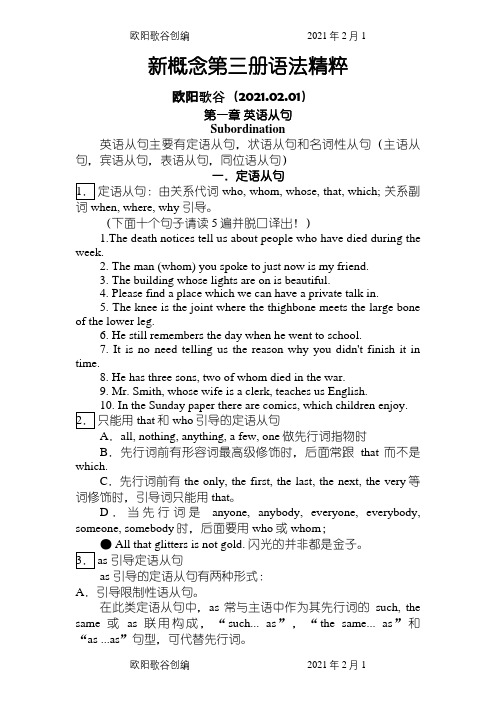
新概念第三册语法精粹欧阳歌谷(2021.02.01)第一章英语从句Subordination英语从句主要有定语从句,状语从句和名词性从句(主语从句,宾语从句,表语从句,同位语从句)一.定语从句定语从句:由关系代词 who, whom, whose, that, which; 关系副词 when, where, why 引导。
(下面十个句子请读 5遍并脱口译出!)1.The death notices tell us about people who have died during the week.2. The man (whom) you spoke to just now is my friend.3. The building whose lights are on is beautiful.4. Please find a place which we can have a private talk in.5. The knee is the joint where the thighbone meets the large bone of the lower leg.6. He still remembers the day when he went to school.7. It is no need telling us the reason why you didn't finish it in time.8. He has three sons, two of whom died in the war.9. Mr. Smith, whose wife is a clerk, teaches us English.10. In the Sunday paper there are comics, which children enjoy.只能用that和who引导的定语从句A.all, nothing, anything, a few, one做先行词指物时B.先行词前有形容词最高级修饰时,后面常跟that而不是which.C.先行词前有 the only, the first, the last, the next, the very等词修饰时,引导词只能用that。
新概念英语第三册语法精粹汇总

新概念英语第三册语法精粹汇总学习新概念英语并不难啊。
你还在为英语成绩低拖后腿而烦恼吗?今天给大家带来新概念英语第三册语法精粹,希望可以帮助到大家,下面就和大家分享,来欣赏一下吧。
新概念英语第三册语法精粹:代替与省略英语中,为了避免不必要的重复,经常用so, not, to, do, does 代替前面出现的动词或相关内容。
如:He translated the article better than I did. (did代替wrote it)— Do you think she is clever?— I think so. (so代替she is clever)(1) 从上两例中看出,do / does / did 代替动词。
(2) "so 与not" 代替某个词、短语、句子等,通常用于hope, think, believe, expect, suppose, be afraid, fear, imagine, etc后作宾语。
E.g. — Is it correct?— Im afraid not. (not correct)(3) "to" 用作不定式,常跟随下列动词:want, mean, hope, expect, refuse, seem, intend, be, afraid, etc.E.g. I asked him to go to the party, but he refused to. (go to the party)(4) "do so, do that, do it" 用来代替动态动词,而不能代静态动词。
Eg. — He gave up studying English.— Why did he do so? (= give up studying English)— The dish tastes nice.— Yes, so it does. (tastes nice)(此句不能用it does it 或it does so, 因taste属静态动词。
新概念英语第三册语法精粹:从句的使用
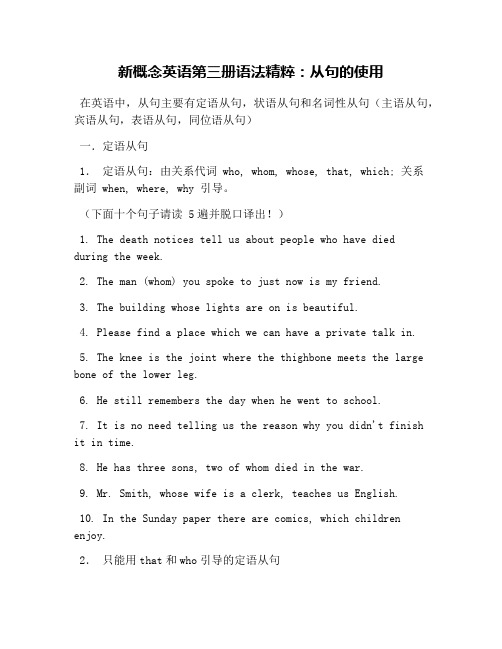
新概念英语第三册语法精粹:从句的使用在英语中,从句主要有定语从句,状语从句和名词性从句(主语从句,宾语从句,表语从句,同位语从句)一.定语从句1.定语从句:由关系代词 who, whom, whose, that, which; 关系副词 when, where, why 引导。
(下面十个句子请读 5遍并脱口译出!)1. The death notices tell us about people who have diedduring the week.2. The man (whom) you spoke to just now is my friend.3. The building whose lights are on is beautiful.4. Please find a place which we can have a private talk in.5. The knee is the joint where the thighbone meets the large bone of the lower leg.6. He still remembers the day when he went to school.7. It is no need telling us the reason why you didn't finish it in time.8. He has three sons, two of whom died in the war.9. Mr. Smith, whose wife is a clerk, teaches us English.10. In the Sunday paper there are comics, which children enjoy.2.只能用that和who引导的定语从句A.all, nothing, anything, a few, one做先行词指物时B.先行词前有形容词级修饰时,后面常跟that而不是which.C.先行词前有 the only, the first, the last, the next, the very等词修饰时,引导词只能用that。
新概念英语第三册语法精粹
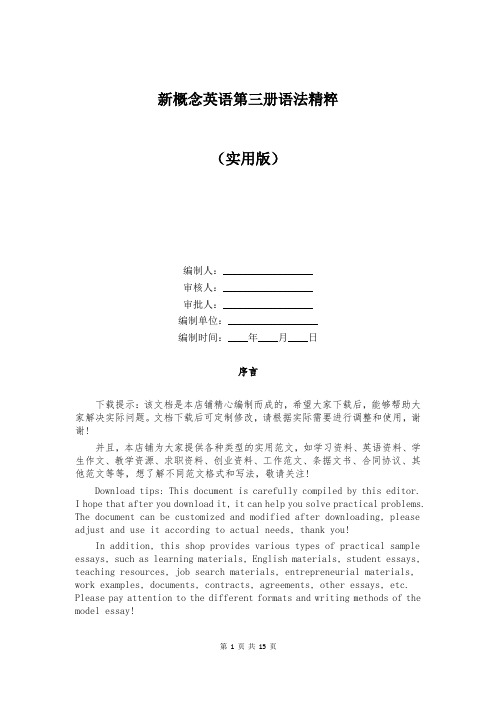
新概念英语第三册语法精粹(实用版)编制人:__________________审核人:__________________审批人:__________________编制单位:__________________编制时间:____年____月____日序言下载提示:该文档是本店铺精心编制而成的,希望大家下载后,能够帮助大家解决实际问题。
文档下载后可定制修改,请根据实际需要进行调整和使用,谢谢!并且,本店铺为大家提供各种类型的实用范文,如学习资料、英语资料、学生作文、教学资源、求职资料、创业资料、工作范文、条据文书、合同协议、其他范文等等,想了解不同范文格式和写法,敬请关注!Download tips: This document is carefully compiled by this editor.I hope that after you download it, it can help you solve practical problems. The document can be customized and modified after downloading, please adjust and use it according to actual needs, thank you!In addition, this shop provides various types of practical sample essays, such as learning materials, English materials, student essays, teaching resources, job search materials, entrepreneurial materials, work examples, documents, contracts, agreements, other essays, etc. Please pay attention to the different formats and writing methods of the model essay!新概念英语第三册语法精粹想要学好英语的你,怎能错过新概念英语第三册语法精粹?今天本店铺给大家带来新概念英语第三册语法精粹,希望可以帮助到大家,下面本店铺就和大家分享,来欣赏一下吧。
新概念第三册核心语法整理
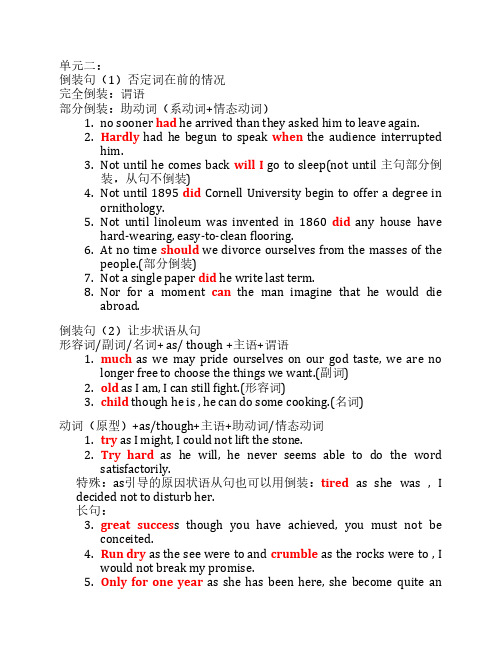
2. I would rather you came to the party tomorrow.(未来)
asked for a better one. 4. To such a degree was he hurt that he would never forgive you. Such+ a +形容词+ 单数名词=so+形容词+a+单数名词 1. He was in such a bedraggled condition that an assistant refused
单元三: 独立主格结构:表示时间,原因,条件,方式和伴随情况 自己主语+无动词分句 现在分词:weather permitting, I will start tomorrow. 过去分词:his homework done , Jim decided to go and see the play. 无动词独立结构:the meal over ,we began to work again. 不定式独立结构:the details to be worked out later, the plan was approved.
1. there appeared on the horizon a man on horseback, riding in my direction.
Now comes your luck. Out rushed the little boy. 主语是代词的时候不用倒装
2. here he comes. 3. Out he rushed.
新概念英语第三册语法精粹:从句的使用
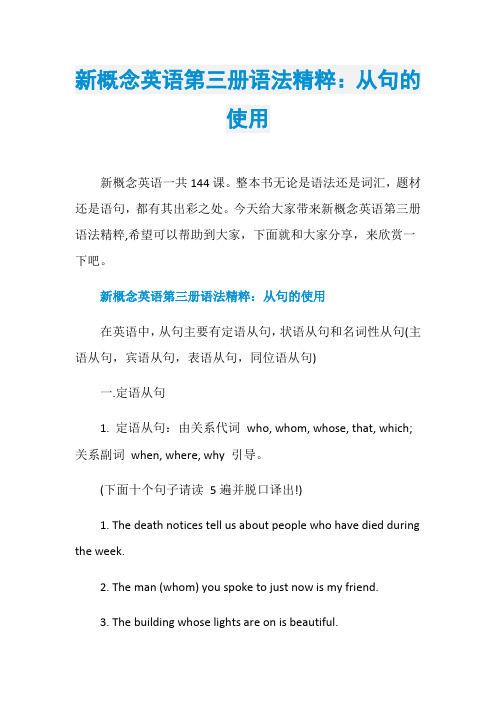
新概念英语第三册语法精粹:从句的使用新概念英语一共144课。
整本书无论是语法还是词汇,题材还是语句,都有其出彩之处。
今天给大家带来新概念英语第三册语法精粹,希望可以帮助到大家,下面就和大家分享,来欣赏一下吧。
新概念英语第三册语法精粹:从句的使用在英语中,从句主要有定语从句,状语从句和名词性从句(主语从句,宾语从句,表语从句,同位语从句)一.定语从句1. 定语从句:由关系代词who, whom, whose, that, which; 关系副词when, where, why 引导。
(下面十个句子请读5遍并脱口译出!)1. The death notices tell us about people who have died during the week.2. The man (whom) you spoke to just now is my friend.3. The building whose lights are on is beautiful.4. Please find a place which we can have a private talk in.5. The knee is the joint where the thighbone meets the large bone of the lower leg.6. He still remembers the day when he went to school.7. It is no need telling us the reason why you didnt finish it in time.8. He has three sons, two of whom died in the war.9. Mr. Smith, whose wife is a clerk, teaches us English.10. In the Sunday paper there are comics, which children enjoy.2. 只能用that和who引导的定语从句A.all, nothing, anything, a few, one做先行词指物时B.先行词前有形容词级修饰时,后面常跟that而不是which.C.先行词前有the only, the first, the last, the next, the very等词修饰时,引导词只能用that。
- 1、下载文档前请自行甄别文档内容的完整性,平台不提供额外的编辑、内容补充、找答案等附加服务。
- 2、"仅部分预览"的文档,不可在线预览部分如存在完整性等问题,可反馈申请退款(可完整预览的文档不适用该条件!)。
- 3、如文档侵犯您的权益,请联系客服反馈,我们会尽快为您处理(人工客服工作时间:9:00-18:30)。
新概念英语第三册语法精粹新概念三册语法精粹第一章定语从句1.定语从句:由关系代词who,whom, whose,that,which;关系副词when, where,why引导。
(下面十个句子请读5遍并脱口译出!)1.The death notices tell us about people who have died during the week.2.The man(whom)you spoke to just now is my friend.3.The building whose lights are on is beautiful.4.Please find a place which we can havea private talk in.5.The knee is the joint where the thighbone meets the large bone of the lower leg.6.He still remembers the day when he went to school.7.It is no need telling us the reason why you didn't finish it in time.8.He has three sons,two of whom died in the war.9.Mr.Smith,whose wife is a clerk, teaches us English.10.In the Sunday paper there are comics, which children enjoy.2.只能用that和who引导的定语从句A.all,nothing,anything,a few,one做先行词指物时B.先行词前有形容词最高级修饰时,后面常跟that而不是which.C.先行词前有the only,the first,the last, the next,the very等词修饰时,引导词只能用that。
D.当先行词是anyone,anybody, everyone,everybody,someone,somebody 时,后面要用who或whom;●All that glitters is not gold.闪光的并非都是金子。
3.as引导定语从句as引导的定语从句有两种形式:A.引导限制性语从句。
在此类定语从句中,as常与主语中作为其先行词的such,the same或as联用构成,“such...as”,“the same...as”和“as...as”句型,可代替先行词。
例如:We hope to get such a tool as he is using.我们希望得到他正在用的那种工具。
B.as引导非限制性定语从句时,作用与which相同,as作为关系代词代替整个主句。
(这是语法考试的一个考点。
)[注意区别]:as引导的从句用于句首、句中或句后,而which引导的定语从句不能放在句首。
例如:As is reported,a foreign delegation will visit the city.据报道,一个外国代表团将访问这个城市。
新概念英语第三册语法精粹(二):状语从句状语从句新概念英语第三册语法精粹((二):):状语从句新概念英语第三册语法精粹①原因:because,since,now that(既然)as,for,this reason....②结果:so that,so,therefore, consequently,so as to,as a result....③时间:after,before,when,while,as, until,as soon as,since,by the time,once, lately,presently,shortly after,currently,at present,nowadays...④条件:if,only if.,once,unless,in the event(that),in case(that),provided that,on the condition that,etc.⑤让步:though,although,even though(if), no matter what/how/when→whatever/ however/whenever....⑥目的:in order that,in order to,to,⑦比较:than,as...as,by comparison(相比较),by contrast(相对照)....新概念英语第三册语法精粹(三):名词性从句名词性从新概念英语第三册语法精粹((三):):名词性从新概念英语第三册语法精粹句王牌要点:通常由that或疑问词导出。
1.How some mammals came to live in the sea is not know.(主语从句)2.The attorney told his client that they had little chance of winning the case.(宾语从句)3.The problem is what we'll do next.(表语从句)4.We have no idea that he has come back.(同位语从句)同位语(同位语(Appositive Appositive Appositive)):同位语是英语语法的重点内容,也是各类考试中的一个考点,同时,在写作中正确运用同位语可以使你的句型更加简洁得体。
《新概念英语》第三册第一课有这样一个句子:When reports came into London zoo that a wild puma had been spottedforty-five miles south of London,they were not taken seriously.(当伦敦动物园接到报告说,在伦敦以南45英里处发现一只美洲狮时,这些报告并没有受到重视。
)在这里,a wild puma had been spotted forty-five miles south of London就是同位语从句,它本来应该放在“reports”后面,这里却被放在了谓语成分came into London zoo的后面,目的是让句型显得更为稳重。
I.简单记忆:同位语从句,就是对某些名词做进一步的解释的句子。
I was greatly shocked when I heard the news that his father died yesterday.(that引导的句子解释了news的内容,注意:that不做任何成分)We have to face the fact that the weather is unexpectedly bad.(that引导的句子解释了fact的内容)II.联想记忆:能接同位词从句的名词有:belief(信仰),fact,idea,doubt,rumor(谣言),evidence(证据),conclusion(结论),suggestion (建议),problem,order,answer,discovery (发现)explanation(解释),principle (原则),possibility(可能性),truth,promise (承诺),report(报告),statement(声明),knowledge(知识),opinion(观点),likelihood(可能性)[大声朗读三遍,背下即可。
]III.王牌要点:●同位语一般由that引导,但也可以用关系代词which,who,what和关系副词when, where,why,how或whether引导。
There arouse the question whether we could win the game.I have no idea howto explain it.●一些介词词组后面也能引导同位语从句。
(非常经典之功能句式,可用于四六级和托福作文,不妨一试!):on the assumption(在……前提下),on the ground(由于……原因),on the condition that(在……条件下),with the exception(有……例外)owing to the fact(由于……事实);on the understanding(基于……理解);The young lady promised to marry the old man on the condition that he bought her a villa.那位年轻的女士答应嫁给那位老头,条件是他给她买一幢别墅。
IV.分隔式同位语从句为了使句型平衡不至于头重脚轻,有时同位语从句可以放到句子的末尾,(读两遍此定义,然后看倒句:)An idea came to him that he might write to her to ask more information about the matter.I got information from my friend that there will be a marvelous American movie "Titanic".V.同位语从句与定语从句之区别简单记忆:定语从句的引导词that或which在句子中用作主语或宾语,而同位语从句的引导词that只起连接主句和从句之作用,不用作任何成分。
示例:I've got an answer that A is right.(同位语从句,that不做成分)I've got an answer that surprised me a lot.(定语从句,that做定语从句的主语)VI.王牌重点:可以充当同位语的词组或短语。
1)名词短语。
(使句型更为简洁)Bill Clinton,the president of America, came to China to pay an official visit in 1998.Lu Xun,one of the greatest essayists in China,played an overwhelmingly important role in Chinese literature history.2)动名词词组亦可用作同位语:别忘了加逗号。
